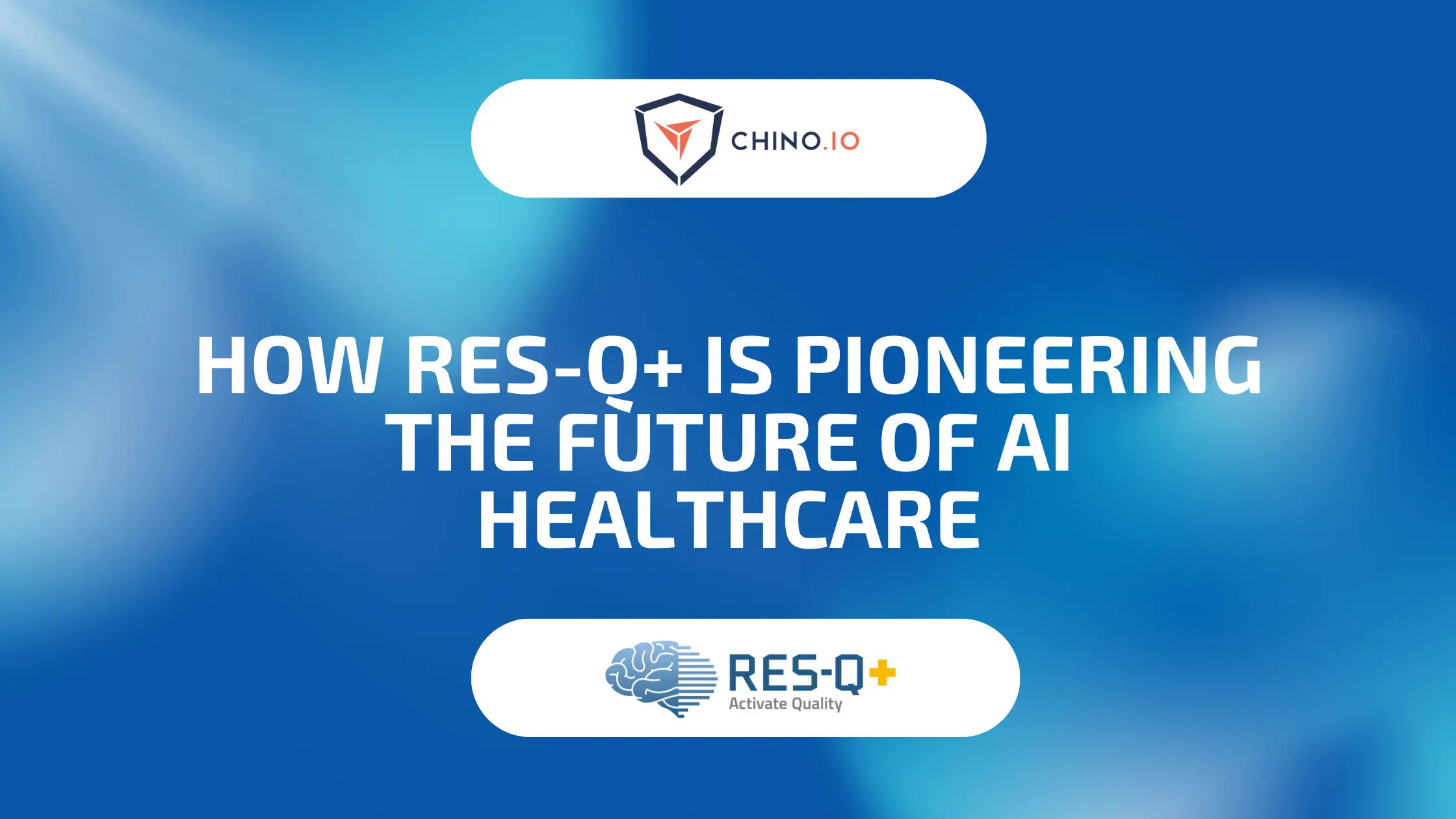How RES-Q+ is pioneering the future of AI in Healthcare
In this article, we’ll explore how RES-Q+ aims to achieve its goals, the challenges of acquiring and using healthcare data for AI, and how companies like Chino.io, a project partner, play a critical role in making it all GDPR-compliant and legally robust.

AI and healthcare are two of the most transformative forces of our time. When combined, they offer powerful possibilities for improving patient outcomes and making healthcare systems more efficient. The European Union is embracing this future through innovative research and collaboration, particularly with projects like RES-Q+, an ambitious initiative focused on revolutionizing stroke care across Europe.
Led by the Institute of Health Information and Statistics of the Czech Republic (IHIS) and supported by a diverse consortium of 21 top-tier institutions, RES-Q+ leverages digital technologies and AI to automate data collection, support clinical decisions, and improve patient monitoring. However, as with all health-related AI initiatives, there’s a major hurdle to overcome: ensuring legal and ethical use of health data.
In this article, we’ll explore how RES-Q+ aims to achieve its goals, the challenges of acquiring and using healthcare data for AI, and how companies like Chino.io, a project partner, play a critical role in making it all GDPR-compliant and legally robust.
1. The Vision of RES-Q+: AI-Driven Stroke Care for a Healthier Europe
The RES-Q+ project builds on the success of the RES-Q Registry, the world’s largest quality registry for stroke care. With over 2,000 hospitals involved globally, this platform already plays a key role in identifying gaps and improving care.
RES-Q+ takes it a step further. It introduces automation and intelligent systems to:
- Collect data directly from hospital systems (without manual input),
- Analyze care quality using virtual assistants,
- Provide real-time feedback to healthcare providers,
- Monitor patients post-discharge using voice- or touch-controlled mobile apps.
Ultimately, the project aims to save lives, reduce healthcare costs, and empower doctors and patients with better tools and insights.
But turning this vision into reality requires data. Lots of it. And that’s where legal and ethical complexity begins.
2. The Legal Puzzle: Why Health Data Is So Sensitive
Health data is among the most sensitive categories of personal data under the General Data Protection Regulation (GDPR). It can only be collected and processed under strict conditions. This poses several challenges for AI projects like RES-Q+:
- Lawful basis: What legal grounds allow hospitals to share patient data for AI development?
- Consent: Can patients truly give informed consent when the end-use of their data (e.g., training predictive models) may evolve?
- Data minimization: How do developers ensure that only the necessary data is collected?
- Cross-border data flows: How can data be shared across multiple EU countries in a compliant way?
Without robust data governance, AI initiatives can quickly run into legal roadblocks. That’s why RES-Q+ includes legal and data protection partners to build a foundation that meets GDPR and national laws.
3. The Role of Chino.io: Building Trust Through Compliance
Enter Chino.io, a RES-Q+ partner that specializes in data protection and compliance for digital health solutions. Their mission is to simplify the legal complexity of handling health data, particularly when it’s used for AI and across multiple jurisdictions.
In RES-Q+, Chino.io is helping to:
- Design GDPR-compliant data flows across 21 institutions,
- Define the lawful basis for processing and sharing patient data (e.g., public interest in the area of public health),
- Develop consent frameworks that are clear, transparent, and meaningful,
- Implement pseudonymization and encryption techniques to ensure data security,
- Support ethical reviews and data protection impact assessments (DPIAs) required under EU law.
By embedding privacy and security into the design from the beginning—an approach known as "privacy by design"—Chino.io helps ensure that RES-Q+ is not only innovative but also trustworthy.
4. Data for AI: More Than Just Numbers
To make AI useful in healthcare, developers need structured, high-quality, and diverse data. But obtaining such data comes with several challenges:
- Interoperability: Hospitals often use different electronic health record (EHR) systems, which complicates automated data extraction.
- Data quality: Missing values, inconsistent formats, or unstructured notes make it harder to train reliable models.
- Bias and fairness: AI systems need data from diverse populations to avoid biased recommendations that harm patients.
- Longitudinal data: Monitoring stroke patients post-discharge requires secure long-term data collection and storage.
RES-Q+ is tackling these challenges by creating a standardized interface that enables hospitals across Europe to share structured data safely. At the same time, its virtual assistant for patients ensures continued monitoring—offering both real-world insights for researchers and real-time support for individuals.
5. The Bigger Picture: The EHDS (European Health Data Space)
RES-Q+ is not just a project. It’s a prototype for the future of healthcare in Europe.
It aligns with the EU’s broader ambitions under the European Health Data Space (EHDS)—an initiative that aims to create a secure framework for sharing health data across the continent for care, research, and innovation.
If RES-Q+ succeeds, it will demonstrate that it's possible to:
- Use AI responsibly in healthcare,
- Build trust among patients and professionals,
- Share sensitive data across borders without violating privacy,
- Create tools that benefit both the healthcare system and the patients it serves.
It’s a future where technology supports—not replaces—human care, and where compliance doesn’t hinder progress but enables it.
Responsible AI Starts With Responsible Data
The RES-Q+ project shows us what’s possible when medical expertise, technology, and compliance come together with a shared purpose. By automating data collection, supporting clinicians with AI, and empowering patients post-discharge, the project has the potential to transform stroke care in Europe.
Yet this transformation relies on a clear understanding of data rights, legal frameworks, and ethical obligations. Organizations like Chino.io are essential in making sure that innovation doesn’t outpace responsibility.
As we continue to explore the promise of AI in healthcare, one thing is clear: Trust is built on transparency, legality, and protection. And only by respecting that foundation can we truly unlock the potential of data to save lives.
Key Takeaways (SEO-optimized summary):
- RES-Q+ is a groundbreaking EU-funded healthcare project using AI to improve stroke care.
- The project involves automatic data extraction, real-time feedback to doctors, and virtual assistants for patients.
- Handling health data for AI requires strict GDPR compliance, including legal basis, consent, and data minimization.
- Chino.io, a legal-tech partner in RES-Q+, helps ensure secure, privacy-friendly data processing.
- RES-Q+ contributes to the vision of a European Health Data Space, setting a model for future digital health projects.
Streamline Your Compliance With Chino.io Today
Discover our
Templates
Read our Latest Industry Insights
Discover insights from our expert writers.




